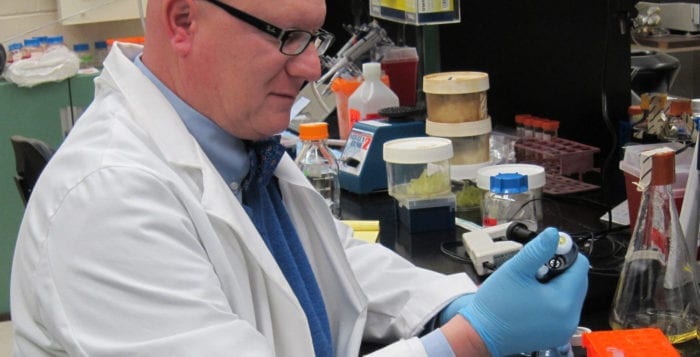By Daniel Dunaief
Sometimes, fixing one problem creates another.
People with multiple sclerosis have been taking a medication called fingolimod for a few years. The medicine calms immune systems that attack the myelin around nerve cells. Fingolimid decreases the lymphocyte number in the bloodstream by trapping them in the lymph nodes.
In a few cases, however, the drug can reduce the immune system enough that it allows opportunistic infections to develop. Cryptococcosis, which is a fungal infection often spread through the inhalation of bird droppings or from specific trees such as eucalyptus, is one of these infections, and it can be fatal if it’s not caught or treated properly, especially for people who have weakened immune systems.
Swiss pharmaceutical giant Novartis contacted Stony Brook University fungal expert Maurizio Del Poeta, a professor in the Department of Molecular Genetics & Microbiology, to understand how this drug opens the door to this opportunistic and problematic infection. He is also exploring other forms of this drug to determine if tweaking it can allow the benefits without opening the door to problematic infections.
Most of the human population has been exposed to this fungus. In a study in the Bronx, over 75 percent of children older than 2 years of age had developed an antibody against Cryptococcus neoformans, which means they have been exposed to it. It is unknown whether these people harbor the fungus or if they have just mounted an immune reaction. Exposure may be continuous, but infections may only occur if a person is immunocompromised.
Fingolimid “inhibits a type of immunity” that involves the movement of lymphocytes from organs into the bloodstream,” Del Poeta said. “Because of this, there are certain infections that can develop.”
Through a spokeswoman, Novartis explained that the company was “happy to have started a scientific collaboration” with Del Poeta to understand the role of a specific pathway in cryptococcus infections.
Cryptococcal meningitis is one of several infections that can develop. Others include herpes meningitis and disseminated varicella zoster. Before starting fingolimid, patients need to receive immunization for varicella zoster virus. At this point, doctors do not have a vaccine for cryptococcosis.
To study the way this drug and its derivatives work, Del Poeta recently received a $2.5 million grant over a five-year period from the National Institutes of Health.
Yusuf Hannun, the director of the Cancer Center at SBU, was confident Del Poeta would continue to be successful in his ongoing research.
Del Poeta “does very important and innovative work on fungal pathogenesis and he is a leader in the field,” Hannun wrote in an email. “His work will enhance our understanding of the molecular mechanisms.”
Fingolimid mimics a natural lipid. Years ago, Del Poeta showed that this sphingolipid, which is on the external surface of the membrane, is important to contain cryptococcosis in the lung. If its level decreases, the fungus can move from the lung to the brain.
While people with multiple sclerosis have developed signs of this infection, it is also prevalent in areas like sub-Saharan Africa, where people with AIDS battle cryptococcosis. About 40 percent of this HIV population develops this fungal infection, Del Poeta said. About 500,000 people die of cryptococcosis every year.
In certain areas of the United States, such as the Pacific Northwest, this fungus is also endemic. On Vancouver Island, about 19 people died from Cryptococcus gattii infections between 1999 and 2007. Most of those patients were immunocompromised.
When the fungus migrates from the lung to the brain, it is “very difficult, if not impossible in most cases, to eradicate,” Del Poeta explained in an email. If the diagnosis is made early enough before the infection spreads to the brain, the recovery rate is high, he suggested. In people whose immune systems are not compromised by drugs or disease, “death is rare.”
Del Poeta plans to study the interaction between the drug and the fungal infection through a mouse model of the disease. The mouse model mimics the human disease and will provide insights on how to control the infection, particularly when the fungus reaches the brain.
Some of the derivatives Novartis has developed do not cause a fungal infection. Del Poeta is working with Novartis to study other forms of fingolimid that do not reactivate cryptococcosis. Del Poeta said Novartis is currently in Phase III clinical trials for another drug for multiple sclerosis. The new drug acts on a different receptor.
“We think the reason the fingolimid reactivates cryptococcosis is that it is blocking one receptor, which is important for the containment” of the fungus. The other drug doesn’t allow the disease-bearing agent to escape.
“This is a hypothesis,” Del Poeta said. He is waiting to corroborate the cell culture data in animal models.
Del Poeta has been working with Novartis for over three years. The Stony Brook scientist used some preliminary studies on the way fingolimid analogs behave as part of the research grant application to the NIH that led to the current grant.
Del Poeta said he is excited about the possibility of contributing to this area.
“Not only will this work contribute to the field of MS, but it will also have a contribution to the field of cryptococcosis,” he said. “This will have important implications for MS patients [and] for the entire HIV population.” He said he believes patients may have some other defect. If he is able to discover what that is, he may be able to protect them from a cryptococcosis infection.
Ultimately, Del Poeta hopes this work leads to a broader understanding of fungal infections that could apply to other pathogens as well.
“Mycobacterium tuberculosis causes a granuloma very similar to the one caused by the cryptococcosis and we could potentially study whether the same molecular mechanisms involved in the control of the infection in the lung are similar between the two infections,” he explained in an email.





